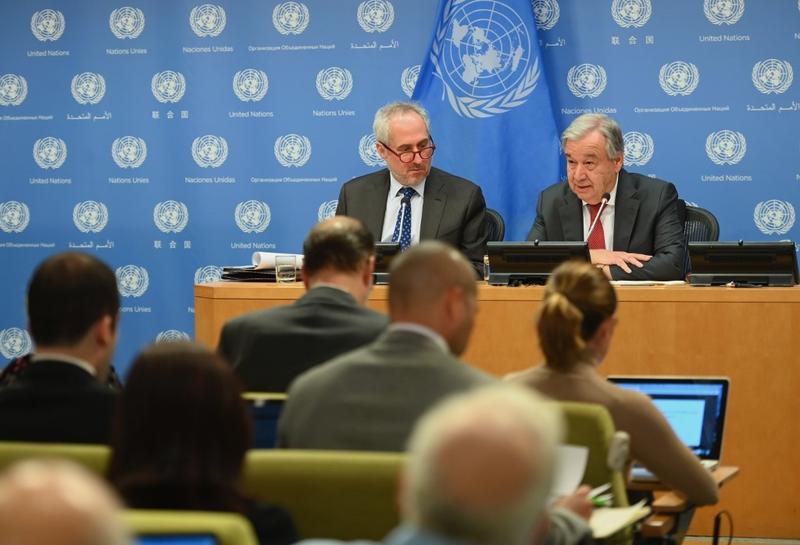 In this Feb 4, 2020 file photo, United Nations Secretary General Antonio Guterres with Stephane Dujarric (left), Spokesman for the Secretary General speaks during a press briefing at United Nations Headquarters in New York City. (ANGELA WEISS / AFP)
In this Feb 4, 2020 file photo, United Nations Secretary General Antonio Guterres with Stephane Dujarric (left), Spokesman for the Secretary General speaks during a press briefing at United Nations Headquarters in New York City. (ANGELA WEISS / AFP)
UNITED NATIONS — It is up to the governing body of the World Health Organization (WHO) to decide where to seek funds in its COVID-19 fight, the chief spokesman for UN Secretary-General Antonio Guterres said on Wednesday.
The WHO is a specialized agency with the World Health Assembly as its governing body and it is up to that governing body to go forward on funding
Stephane Dujarric, the chief spokesman for UN Secretary-General Antonio Guterres
Stephane Dujarric said it was up to the World Health Assembly, the 194-member state governing body, to decide where to look for funding in the face of the United States withdrawing from WHO financing.
US President Donald Trump announced Tuesday that he had instructed his administration to suspend funding for the WHO, which he accused of "severely mismanaging and covering up the spread of the coronavirus."
Trump's action was seen by many as a distraction from his tardiness in acting.
The spokesman was asked at a regular virtual briefing where the WHO was looking to replace the US funding while a "review" was conducted by the Trump administration.
"The WHO is a specialized agency with the World Health Assembly as its governing body and it is up to that governing body to go forward on funding," Dujarric replied.
"The secretary-general's message is very clear: now is not the time to stop funding of the WHO or any other humanitarian organization that is involved in the COVID-19 response," Dujarric said.
The spokesman said the secretary-general "made clear once more that once we have finally turned the page on this epidemic, there must be a time to look back fully to understand how such a disease emerged and spread its devastation so quickly across the globe, and how all those involved reacted to the crisis. But now is not that time."
A caution note for children from the UN Children's Fund (UNICEF), the WHO, other UN agencies and partners, was issued Wednesday.
They warned that millions of children are at increased risk of harm as their lives move increasingly online because of lockdowns during the pandemic, the spokesman said.
ALSO READ: US decision to halt funding to WHO draws sharp criticism
More than 1.5 billion children and young people have been affected by school closures worldwide and many of these students are now taking classes and socializing online.
Spending more time on virtual platforms can leave children vulnerable to online sexual exploitation and grooming and may also expose children to potentially harmful and violent content as well as risk cyberbullying, he said.
A new technical note urges governments, information and communication technology industries, educators and parents to be alert, to take urgent measures to mitigate potential risks and ensure children's online experiences are safe and positive during COVID-19, Dujarric said.
In India, the WHO said it will work with the Ministry of Health and Family Welfare to leverage the strategies that helped the country win its war against polio into the response to the COVID-19 pandemic, the spokesman said.
The WHO national polio surveillance network will be engaged to strengthen COVID-19 surveillance and WHO field staff will continue to support immunization and elimination of TB and other diseases, he said.
India eliminated polio in 2014.
Dujarric said the UN staff in Myanmar, together with national and international partners, is supporting health authorities and scaling up efforts to prevent and control the outbreak of COVID-19 and improve access to health care in humanitarian settings.
The United Nations is focusing on vulnerable communities and frontline health workers, he said. Myanmar's Humanitarian Fund has mobilized the first reserve allocation of 2 million US dollars to support a coordinated response for displaced people and other vulnerable crisis-affected people in Chin, Rakhine, Kachin, Shan and Kayin states.
The UN team in Myanmar, together with national authorities, has mobilized funds to obtain necessary medical equipment to conduct 20,000 COVID-19 tests, the spokesman said.
The High Commissioner for Human Rights, Michelle Bachelet, urged countries in Latin America, and elsewhere in the world, to open their borders to their nationals stranded abroad in the COVID-19 pandemic, many of them with little or no access to healthcare.
Bachelet said that under international law, everyone has the right to return to their home, even during a pandemic.
The UN Department of Economic and Social Affairs cautioned in a new policy brief that many commodity-dependent economies in Africa and Latin America will likely face an economic crisis before they are directly hit by COVID-19, which will further limit their ability to handle a health crisis.
READ MORE: Trump says halting US funding to World Health Organization
The new brief warned that action is needed now to avert a full-blown debt crisis, as the economies are in a significantly tighter fiscal position than they were in 2009 when they were hit by the global financial crisis, making it very difficult for them to borrow externally and finance large fiscal stimulus.
In Nigeria, UN colleagues report that a shipment of ventilators and other essential medical supplies obtained by the United Nations in the country has arrived to fight COVID-19, Dujarric said.


